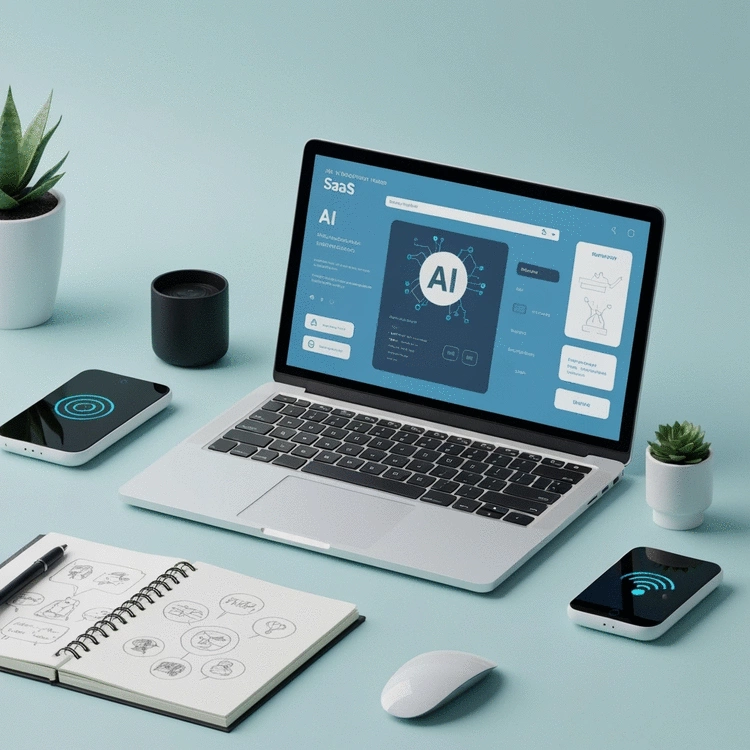As we approach 2025, the integration of AI into SaaS platforms is not merely a passing trend; it's a transformative shift that will redefine how businesses operate. How can you harness this momentum to elevate your business strategy?
What You Will Learn
- The increasing adoption of AI technologies is enhancing user experience across SaaS platforms.
- Personalization is key; businesses are focusing on tailored solutions that boost user engagement.
- Cloud computing advancements are facilitating scalable and cost-effective AI SaaS solutions.
- Understanding common business pain points in 2025 can guide the development of effective AI-driven solutions.
- Opportunities for innovation include AI-enabled content optimization, automated e-commerce solutions, and predictive analytics.
- Aspiring AI SaaS entrepreneurs should prioritize market research and validation of their ideas.
Key Opportunities & Challenges in AI-Driven SaaS by 2025
The visual below illustrates the significant opportunities AI-driven SaaS presents and the common pain points businesses face, which these solutions aim to address. For a deeper dive into the foundational technologies driving these advancements, consider exploring understanding cloud infrastructure.
Opportunities in AI-Driven SaaS
AI-Enabled
Content Optimization
Automated
E-commerce Solutions
Predictive
Analytics
AI Model
Monitoring Platforms
Identifying Pain Points for Businesses
Managing
Data Overload
Meeting
Customer Expectations
Addressing
Operational Inefficiencies
Understanding the Growth Potential of AI-Driven SaaS in 2025
The future of SaaS (Software as a Service) is undoubtedly intertwined with the meteoric rise of artificial intelligence. By 2025, we expect to see significant growth in AI-driven SaaS solutions, transforming how businesses operate and engage with customers. The integration of AI into SaaS platforms is not just a trend; it’s a fundamental shift that speaks directly to the needs of modern enterprises.
As I explore these exciting developments, I invite you to consider how AI is reshaping our world. This shift represents not just opportunities for tech innovators, but also a chance for businesses to streamline operations, enhance customer experiences, and drive productivity. Let’s dive into some of the key market trends steering this evolution.

Market Trends Shaping the Future of SaaS
Today, the SaaS landscape is ripe for disruption. Several key trends are paving the way for AI's integration into various platforms:
- Increased Adoption of AI: More companies are leveraging AI technologies to enhance functionality and user experience.
- Focus on Personalization: Businesses seek tailored solutions that cater to individual user needs, improving engagement and satisfaction.
- Expansion of Remote Work: As remote work becomes the norm, SaaS solutions that enhance collaboration will thrive.
- Data-Driven Decision Making: Companies are prioritizing analytics capabilities, allowing for more informed strategic decisions.
These trends indicate a robust growth trajectory for AI-driven SaaS products. In my discussions with industry experts, I’ve often heard about the importance of flexibility and scalability in software solutions. As we look ahead, these characteristics will be essential for staying competitive. To learn more about optimizing your SaaS offerings, check out our guide on optimizing SaaS offerings.
Impact of Cloud Computing on AI SaaS Solutions
The synergy between cloud computing and AI is a game-changer for SaaS applications. As cloud infrastructure becomes more sophisticated, it facilitates the development and deployment of AI technologies, allowing businesses to harness the power of data like never before. Here are some key impacts of cloud advancements:
- Scalability: Cloud solutions allow SaaS products to scale efficiently according to user demands.
- Cost-Effectiveness: Businesses can minimize infrastructure costs while accessing powerful AI capabilities.
- Enhanced Collaboration: Cloud platforms foster real-time collaboration, making it easier for teams to work together across distances.
This cloud-AI partnership not only lowers barriers to entry for startups but also empowers established businesses to innovate rapidly. Reflecting on my experiences, I’ve seen companies transform their operations through these technologies, aligning with our mission at The Stone Builders Rejected to provide insight into these critical developments.
Identifying Pain Points for Businesses in 2025
As we look toward 2025, it's crucial to recognize the common challenges businesses face, many of which AI-driven solutions can effectively address:
- Data Overload: Organizations struggle to manage and extract value from vast amounts of data.
- Customer Expectations: Keeping up with rapidly changing consumer demands can be daunting.
- Inefficiencies in Operations: Businesses often grapple with outdated processes that hinder productivity.
Understanding these pain points allows AI-driven SaaS solutions to cater specifically to those needs. As I engage with various businesses, the dialogue often returns to the necessity of adapting to these challenges. By harnessing the power of AI, companies can not only survive but thrive in the face of adversity.
Engage With Us!
As we explore the future of AI-driven SaaS, we want to hear your thoughts! How do you envision AI transforming your business in the next few years? Share your insights and predictions in the comments below!
Frequently Asked Questions (FAQs)
Summarizing the Opportunities in AI SaaS for 2025
As we look ahead to 2025, it's clear that the landscape of AI-driven SaaS solutions offers numerous opportunities for innovation and growth. Throughout this article, we've explored a variety of cutting-edge concepts that can address current market needs while enhancing business operations. From automated e-commerce tools to AI-enhanced content optimization platforms, the potential for transformation is significant!
To recap, here are some of the key opportunities we've identified:
- AI-Enabled Content Optimization Tools: These tools help businesses fine-tune their marketing strategies to achieve better engagement.
- Automated E-commerce Solutions: Such solutions are set to streamline operations and offer enhanced customer experiences.
- Predictive Analytics: This will allow businesses to make data-driven decisions, improving their strategic planning and execution.
- AI Model Monitoring Platforms: With a focus on data integrity, these platforms ensure that AI applications remain reliable and effective.
- Speech Recognition Software: This technology is poised to revolutionize customer support by improving interaction efficiency.
- Chatbots: Incorporating chatbots into SaaS applications can elevate user experience and operational efficiency.
- Subscription Automation Tools: These tools simplify subscription management, crucial for SaaS companies to thrive.
The growth in these areas reflects a broader trend towards greater integration of AI technologies in business operations, promising not just efficiency but also improved customer satisfaction.

Next Steps for Aspiring AI SaaS Entrepreneurs
As an aspiring entrepreneur in the AI SaaS realm, now is the time to harness your ideas and transform them into actionable strategies! It's essential to take the insights gained from this article and explore how they can apply to your unique vision. Consider the market needs you've identified and how your AI-driven solutions can fill those gaps.
Here are a few steps to get you started on your journey:
- Research Your Market: Understand your target audience and their specific pain points.
- Validate Your Idea: Use surveys, interviews, or prototypes to gather feedback on your concept.
- Develop a Business Plan: Outline your strategy, including marketing and financial projections.
- Seek Mentorship and Funding: Connect with industry experts and explore funding options for your venture.
With determination and creativity, you can bring your AI SaaS startup to life! Remember, as we navigate this evolving landscape, collaboration and learning from each other's experiences are key. For more in-depth advice on launching a successful tech venture, read our post on launching a successful tech venture.
Invitation to Share Insights and Experiences
I’d love to hear from you! If you have thoughts, questions, or experiences related to AI SaaS startups, please share them in the comments below. Your insights can help foster a vibrant community of innovators eager to explore the future of technology together. Let’s engage in a discussion that inspires and empowers! Additionally, if you're interested in understanding the broader trends impacting digital businesses, you might find our article on digital business trends for 2024 insightful.
Recap of Key Points
Here is a quick recap of the important points discussed in the article:
- Increased Adoption of AI: Companies are increasingly leveraging AI to enhance SaaS functionality and user experience.
- Focus on Personalization: Businesses are seeking tailored solutions to improve user engagement and satisfaction.
- Expansion of Remote Work: SaaS solutions that facilitate collaboration are thriving as remote work becomes standard.
- Data-Driven Decision Making: Prioritizing analytics capabilities enables companies to make more informed strategic decisions.
- AI-Enabled Innovations: Opportunities in AI SaaS include content optimization tools, automated e-commerce solutions, and predictive analytics.
- Understanding Pain Points: AI-driven solutions can address challenges like data overload and evolving customer expectations.
- Next Steps for Entrepreneurs: Research, validate ideas, develop business plans, and seek mentorship to launch successful AI SaaS startups.





